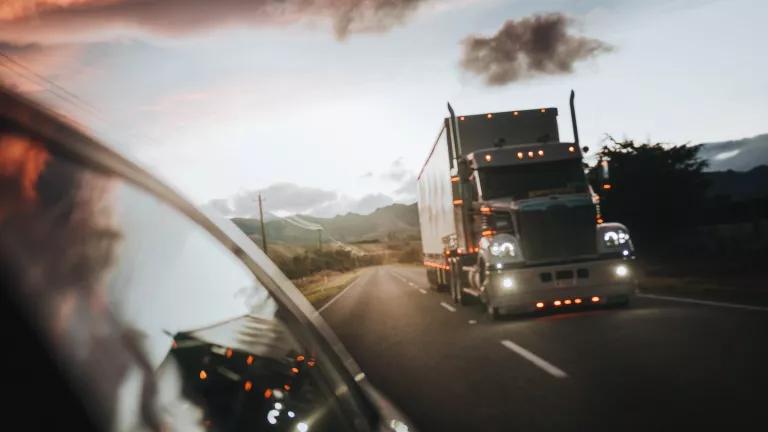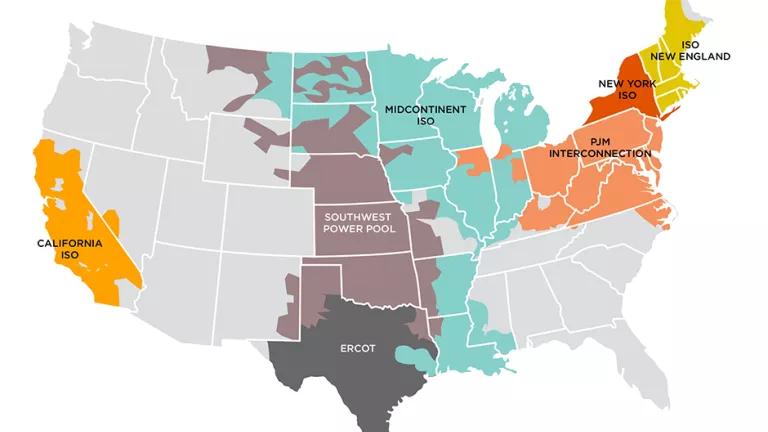States Embrace the Transition to Clean Cars
The federal government has made strides to help bolster the electric vehicle market, attract manufacturing, and ensure a robust charging network. But in many ways, states led the way.

Shutterstock
This blog is Part of NRDC’s Year-End Series Reviewing 2022 Climate & Clean Energy Developments
As I look back and reflect on the past year, it’s hard to not feel that 2022 was a pivotal point in transition towards a clean, affordable transportation future. And it’s even more encouraging to see that a large part of this leadership came from states.
The transportation sector is the largest source of greenhouse gas emissions in the U.S. and transitioning towards electric vehicles is a key strategy towards zeroing out pollution from this sector, all while cutting pollution, improving human health, and saving drivers money.
The federal government has made historic and monumental strides to help bolster the electric vehicle market, bring manufacturing and supply chains into the United States, and ensuring a robust electric vehicle charging station infrastructure network with the implementation of the Infrastructure Investment and Jobs Act and the passage of the Inflation Reduction Act.
But, in many ways states led the way toward a clean transportation future.
State Action
California—Leading the Way
In August, California adopted year-over-year requirements that move to 100% new zero-emission vehicle sales by 2035. These rules, called the Advanced Clean Cars II (ACC II) program, were officially approved on November 30. Under the Clean Air Act, these rules can be implemented once the EPA grants California a waiver, and other states can now adopt these regulations and get on the road to a cleaner, stronger transportation future.
Vermont
Vermont became the first state to adopt the Advanced Clean Cars II regulations outside of California on December 1—with an effective date of December 16. Vermont went a step further in its regulations, though, and in one regulatory package also adopted the Advanced Clean Trucks and Heavy-Duty Omnibus rules that will help to significantly reduce emissions from trucks and buses driving on Vermont’s roads.
Washington
Sales of zero-emission vehicles continue to increase in Washington, having the second highest state sales in the country in 2022 at 11.6%. Earlier this year, Governor Jay Inslee signed into law a goal to have 100% new clean car sales by 2030. The Department of Ecology has proposed adoption of the Advanced Clean Cars II regulations which is the mechanism to achieve that goal. The state will consider adoption of the regulation on December 19.
Oregon
Like its neighbors, Washington and California, Oregon also saw a dramatic increase in EV sales this year, making the Pacific West the center of EV sales in the United States. To help further accelerate the transition to EVs, Oregon is also considering adoption of ACC II. On December 19, the Environmental Quality Board (EQB) will vote on these rules.

Source: Atlas Public Policy's EV Hub
New York
In 2021, New York became the first state in the country to adopt in statute a goal for 100% new electric vehicle sales by 2035, solidifying itself as an East Coast leader on clean cars. In September, Governor Kathy Hochul announced New York’s intention to adopt ACC II by the end of 2022 to ensure that New York can participate in the first year of the program (vehicle model year 2026). The state could adopt the rule to do this in the coming weeks.
Massachusetts
Massachusetts has also announced plans to adopt ACC II by the end of 2022 and those rules are imminent.
New Mexico
In May, New Mexico adopted the first iteration of the Advanced Clean Cars program (ACC I), which will require automakers in the state to sell at least 7-8% new clean vehicles in model year 2025—officially becoming the 18th state to adopt these regulations. Since ACC I ends after 2025, the state should adopt the ACC II regulations expeditiously.
Delaware
Currently, Delaware and Pennsylvania are the only two states in the country that have adopted only the tailpipe emissions portion of the clean car rules and not zero-emission vehicle sales requirements. However, Delaware announced plans to adopt the sales requirement portion of the clean car standards by adopting ACC II. The Department of Natural Resources and Environmental Control started the stakeholder process this fall on these regulations.
Colorado
In its draft EV plan, Colorado announced that it will be considering adoption of ACC II in 2023. However, unlike other states, Colorado is only considering adoption of the regulation through model year 2032. We are advocating for the state to follow the leadership of other states by adopting the rule through 2035.
Looking Forward
2022 was a big year for clean transportation, but 2023 could be the year when the EV rubber meets the road. While there have been no official announcements, we are hopeful that other states— including New Jersey, Maryland, Connecticut, Rhode Island, Maine, and New Mexico— will also move forward to adopt ACC II in the new year.
We still have a lot to do, though—while state leadership on these issues is vital, the federal government needs to do its part and issue the strongest possible standards so that everyone in the country will have access to the cleanest, best vehicles – and our children and families can enjoy clean air and a safer future.




